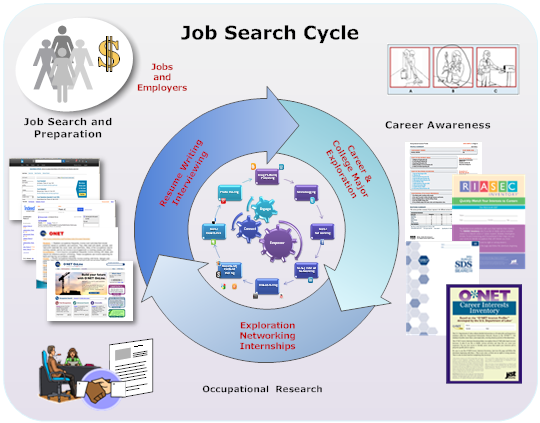Get Career Help
Our graphic shows you different ways to get career help and to find the right career path -
- Social media tools
- Career guides
- Career coaches
- Information about careers or career paths
Career Help#1: Social Media Tools
Social media technology promotes social networking, building contacts to get career information.
Hollandcodes.com has blogs that broadcast information about the following areas -
- Career development
- Social media
- Career education
- Career assessment tests
- Holland Codes resources
Career Help#2: Career Guides
Career guides can provide valuable information about 10 Top Tips Booklet:
- Follow The Road Map To Career Planning
- Recognize Your Interests, Abilities, Talents and Values.
- Learn Your Holland Personality Types and Codes.
- Acquire Career Clusters Information.
- Explore Careers.
- Identify Potential College Majors.
- Get The Quick Career Test Facts!
- Use Career Test Rating Chart.
- Get Detailed Information from the HollandCodes.com Catalog.
- Put All of the Facts Together. Use Career Test Checklist.
View our Flip Book.
Career Help#3: Features of Career Tests
A Holland Code job career test helps you find career job opportunities, career job descriptions, and career search sites. With a job career test, you test your own job aptitude.
Select the right career assessment, look at the -
- Format - printed and interest resources, CD-ROM,
- Types: Job career questionnaire test, job personality tests, career job finders, career counseling tests, career placement test, career assessment tests, and career choice tests
- Cost - $10, $12, $15, $20, or more per assessment
- Resources that are available - Career job descriptions, career job opportunities, college majors information, job finder resources, career clusters information, holland code careers
- Grade Levels
Holland career self assessment tests use Holland Codes to link vocational interests to job families. Holland assessments use a two or three-letter RIASEC or Holland Occupational Codes. Different Holland Code job career questionnaire tests provide information on the relationship between job personalities and key characteristics, college majors, hobbies, abilities, and related careers.
Career Help#4: Career Paths

There are three steps to provide career help in identifying career goals and searching for a job.
Step One: Get a Clear Career Goal
The first step in search for a job is setting a career goal.
In order to set a career goal, you have to take inventory of yourself to determine what you can offer an employer.
You need to –
- Build awareness, knowledge and understanding of our strengths, interests, abilities, and skills
- List your ambitions, values, education, and experiences
- Determine your job preferences –job duties, salary, geographic location, and work conditions
Step Two: Explore Career Options
In order to identify potential careers, you may use career exploration and social media resources to gather the following occupational information –
- Labor market
- Work industries
- Companies, organizations, or agencies
- Specific careers
Use online career exploration resources to identify potential careers.
Step Three: Overcome Career Roadblocks
When you are trying to reach a
career goal, there will always be obstacles. You solve career problems
by completing the following steps –
- Identify educational and career planning obstacles
- Create solutions or courses of action
- Set achievable goals
- Resolve conflicts
- Commit to reach our goals
Problem solving
should take into consideration personal interests, skills, values, and
financial resources. Big problems are broken down into smaller, more
manageable steps. Achievable goals result in the production of new
competencies, attitudes, and solutions.
As an individual, you:
- Set, formulate, prioritize, and rank goals
- Clearly state our vocational interests, abilities, and values
- Derive plans or strategies to implement the solutions
- Make a commitment to complete the plans
- Understand decision-making processes
- Evaluate the primary choice
- Consider a secondary occupational choice, if necessary
Decision-making processes include:
- Develop a career plan
- Identify a potential occupations
- Selecting appropriate educational programs
- Figuring the costs of educational training
- Considering the impact of career decisions.
Step Four: Execution
You execute your career plans when you use different strategies –
- Reality testing
- Social Media
- Job Search Strategies – Resume Writing and Interview Preparation
Reality Testing
While implementing and, you
translate vocational interests, abilities, and skills into job
opportunities. You do reality testing by implementing the following
strategies –
- Informational interviewing
- Networking
- Job shadowing
- Internships
- Part-time employment
- Full-time employment
- Volunteer work
Social Media and Networking Tools
Networking can help you complete
targeted job searches. You can use a variety of social media tools to
learn and connect with professional associations and potential
employers. Three major networking social media tools are –
- Facebook
Resume Writing and Interviewing Strategies
Resume writing and interview preparation are essential skills needed to land a potential job.
Resumes
Your resume is your sales tool that lets employers know your strengths, interests, experience, and educational background.
The appearance of your resume is
extremely important. Check the appearance of your resume - your font,
spelling, spacing, margins. In a resume, you will highlight your skills
that make you unique and set you apart from others. Common areas
covered in a resume are –
- Objective (optional)
- Skills
- Education
- Honors/ Awards
- Experience
- Volunteer Experience (if relevant to the potential job)
Types of resumes are –
- Chronological – listing experiences in reverse chronological order
- Functional – emphasizing specific skills
Interviewing
There are steps to prepare for a successful interview -
- Review common interview questions
- Prepare for behavior or STAR interviews
- Practice - Practice is essential for a successful interview.
- Dress for success